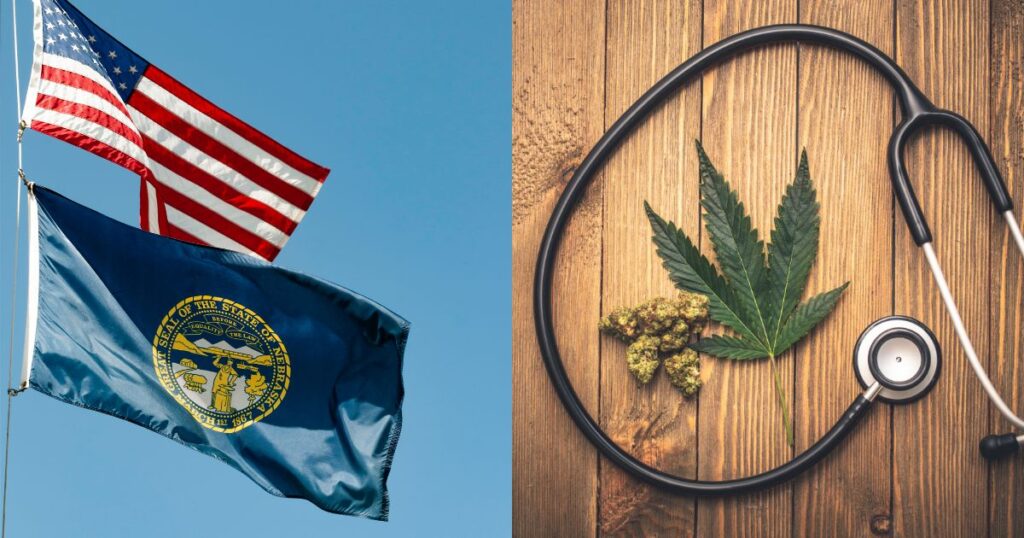On July 1, 2025, Nebraska Governor Jim Pillen officially approved emergency regulations to guide the licensing and regulation of medical cannabis establishments in the state.
This follows the support shown by voters in 2024 when medical cannabis was legalized with clear mandates. These regulations signify Nebraska’s long-awaited step toward a structured medical cannabis market, but not without challenges and strict guidelines.
Understanding the Emergency Regulations
The emergency regulations, signed by the governor mere hours before the mandated deadline, set the foundation for Nebraska’s nascent medical cannabis framework.
These rules enable the Nebraska Medical Cannabis Commission (NMCC) to begin accepting applications from cultivators, product manufacturers, dispensaries, and transporters. Licensing must officially begin by October 1, 2025, aligning with voter-approved measures.
The emergency regulations will remain effective for 90 days, through September 28, 2025. If necessary, they can be extended for an additional 90 days.
However, the NMCC plans to transition to formal, permanent rules by the October deadline after engaging the public in a formal rulemaking process.
Focus Areas of Nebraska Emergency Medical Cannabis Regulations
Licensing Criteria
Under Nebraska’s emergency medical marijuana rules, any individual or business can apply for one of four types of licenses: cultivator, product manufacturer, dispensary, or transporter.
However, vertical integration is prohibited, meaning no entity can hold multiple license types. To ensure local involvement, applicants must meet strict residency requirements, with at least 51% ownership by Nebraska residents who have lived in the state for at least four years.
Additionally, applicants are subject to stringent checks:
- Fingerprinting and national criminal background checks.
- Prohibition of anyone with felony convictions or controlled substance offenses in the past decade.
- Exclusion of any state or local government entities as well as health care practitioners who have issued cannabis recommendations in the previous five years.
Licenses are valid for two years and are non-transferable. Renewal applications must be submitted at least 90 days before the license’s expiration.
Nebraska’s Medical Cannabis Dispensary Regulations
The NMCC placed limitations on dispensaries to ensure equitable access across Nebraska’s vast geography. A maximum of one dispensary license will be issued per judicial district, of which there are 12 in the state.
Critics argue this limit may inadequately serve patients in rural areas west of major cities, where geographic spread and population density collide with logistical challenges.
Dispensaries are also constrained in the types of products they can sell. Prohibited products include:
- Raw cannabis plant material.
- Edibles infused with cannabis.
- Products intended for smoking, combustion, or vaping.
- Items containing artificial flavorings or cannabinoids such as delta-8 and delta-10 THC.
Instead, allowed products are limited to oral tablets, tinctures, topical creams, and similar formulations. All packaging must be tamper-evident and childproof.
Cultivation and Manufacturing Standards
Cultivators must adhere to strict guidelines for the production of medical cannabis while maintaining detailed records. They are limited to cultivating cannabis on licensed premises, which must be secure to prevent unauthorized access or contamination.
Similarly, manufacturers are restricted to producing cannabis formulations permitted for medical use, with labeling requirements that warn consumers of safety risks.
These measures aim to address concerns regarding safety while building a compliant and regulated marketplace that avoids legal uncertainty.
Public Engagement and Oversight
Public feedback is a focal point in Nebraska’s medical marijuana regulatory progression. Stakeholders, businesses, and residents have been invited to provide written comments on the emergency regulations through July 15, 2025, which you can email to lcc.frontdesk@nebraska.gov.
This feedback offers significant potential to shape the formal rulemaking process.
Meanwhile, the NMCC and Governor’s Policy and Research Office are working alongside the state’s Department of Health and Human Services to finalize a permanent framework.
Legal and Social Context Surrounding the Regulations
It’s important to note that Nebraska’s medical marijuana legalization efforts still face legal opposition. Historically resistant to cannabis reform, Nebraska’s Attorney General Mike Hilgers has signaled potential litigation if licensing proceeds.
Critics also point out gaps in the emergency regulations, particularly the lack of guidance for dispensary placement and inventory management.
Another contentious topic is the exclusion of whole-plant cannabis products, often preferred by many patients for their therapeutic potential.
Activists like Crista Eggers, Executive Director of Nebraskans for Medical Marijuana, have already expressed frustration with what they view as overly restrictive rules that diverge from the broader intent of the ballot initiatives.
Eggers argues that denying patients access to products like raw flower violates the spirit of the law. Advocacy groups warn that continued hurdles could undermine the rights of patients who supported legalization.
From a larger perspective, Nebraska is joining a growing list of states that are navigating conflicts between state-level legalization and federal prohibition, as cannabis currently still remains a Schedule I controlled substance under federal law.
What’s Next Medical Marijuana in Nebraska
Nebraska’s future with medical cannabis depends heavily on how these regulations roll out in practice. Licensing submissions, due to open soon, will mark the first tangible step toward operational medical cannabis establishments.
Advocates and critics alike are waiting to assess whether these emergency measures will evolve into a fair and accessible system.
If you’re a business owner interested in entering Nebraska’s regulated cannabis market, ensure compliance with all licensing criteria and monitor updates from the NMCC as regulations take shape.

















